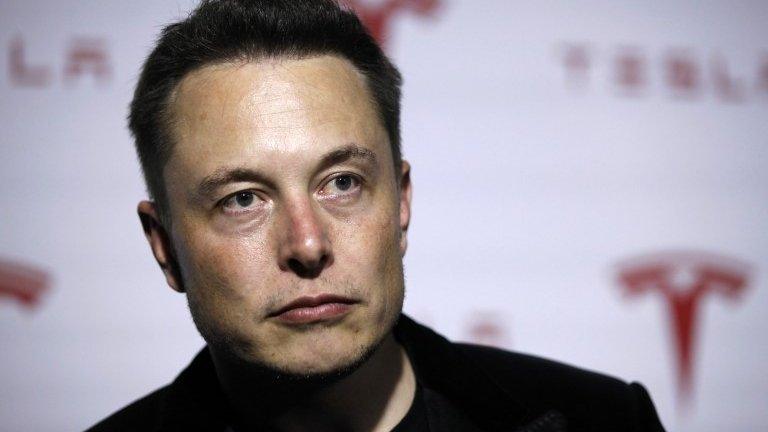Is Hyperloop the future of high-speed travel?
- Published
WATCH: Is Hyperloop the future of inter-city travel?
"Yeehaw!" cries the rocket-engineer as he drives the all-terrain buggy hard over the rocks and scrub of the Nevada Desert.
With his big hat and moustache, he looks like a cowboy riding out over his territory.
The chap in the borrowed bright-orange quilted jacket, hanging on for dear life in the back, looks less at home. That's me.
I had expected cold weather, but not the chill of hurtling through desert air at 6C in fog and rain.
The excitingly named Brogan BamBrogan - yes, he changed it; no, I didn't ask why - is taking me on the very first tour of 50 acres (0.2 sq km) of desert that will, in the next year, become a test track for the Hyperloop.
Put into development by Tesla and SpaceX boss Elon Musk, Hyperloop is an idea of colossal ambition and science-fiction proportions.
Passengers and freight will sit in pods propelled at high speed from city to city, inside low-pressure tubes on stilts above the landscape.
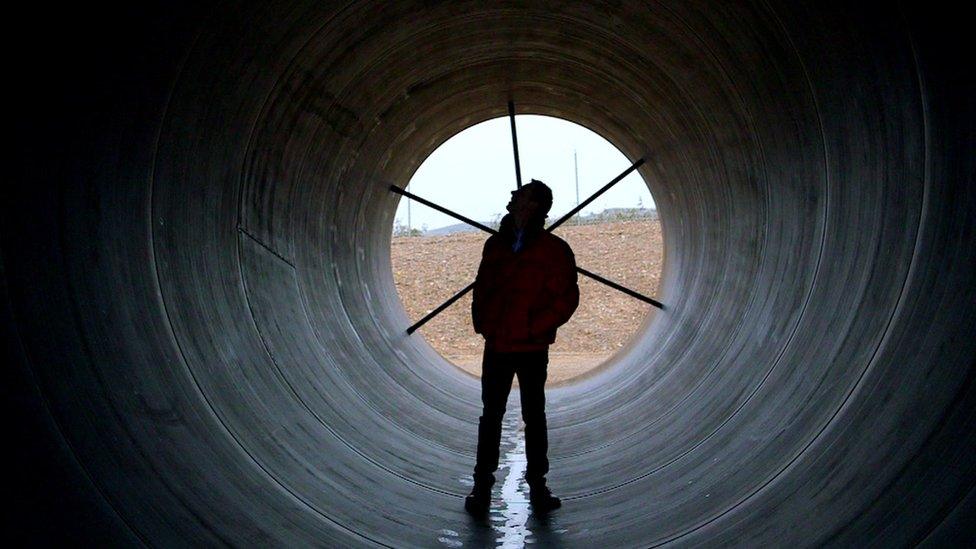
Travel in the Hyperloop could reach speeds of 700mph
"It will have a top speed of over 1,000km/h [620mph]," Mr BamBrogan shouts over the engine.
"We will use the pillars to even out the bumps in the terrain so people don't feel weird."
The buggy bounces over a rock and whisks past the 20 massive tubes already on site, and I find what concerns me is not the technical challenge.
I can absolutely believe the skills Hyperloop Technologies has brought in from the likes of SpaceX could crack the science, overcome the air resistance, and withstand the acceleration - it will be gentle.
What my mind, lacking as it does the ambition, faith and blue-sky thinking of some of Hyperloop's backers and directors, cannot envision, is that within the next decade or so we could see the beginnings of something so radical that it would transform the landscape.
"This is a big deal," I call back, "an entirely new form of transport. Do you think it will ever come off?"
Mr BamBrogan replies: "It will absolutely come off.
"This is the first generation that has not seen a new form of transport.
"People over the years have seen advancements, and it has changed their lives."

Analysis: Prof David Bailey, Aston Business School
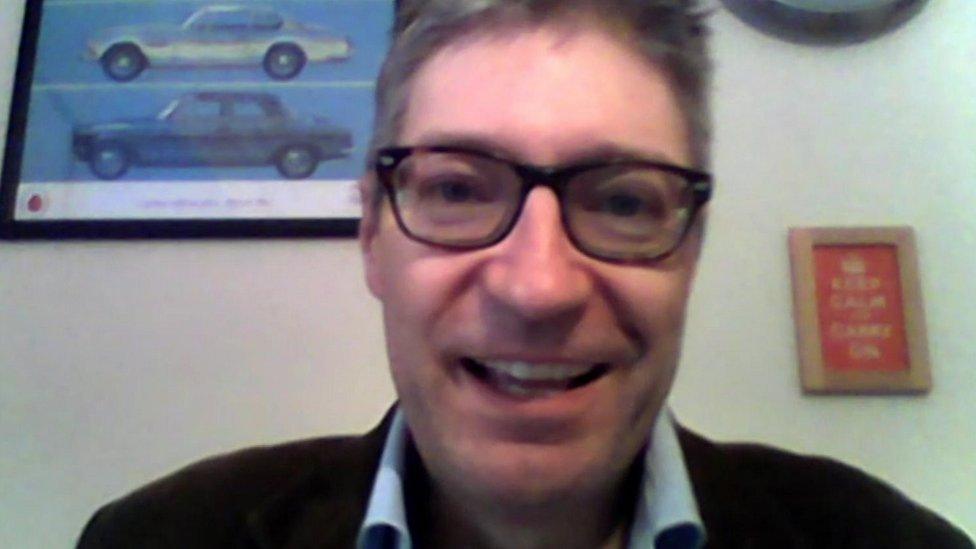
There are big barriers to doing this - would people really want to get inside a vacuum tube and be propelled at up to 700mph?
It doesn't sound very comfortable.
Given the time you would need to accelerate to 700mph and back to stationary, you would have to have quite a gap in-between the pods to make it safe.
I would question whether you could get the throughput of people Hyperloop suggests.
But mostly I think my concern is over the cost of it.
The cost of putting anything on pylons or stilts is expensive.
And the thought of building that across California sounds very expensive indeed to me.
Of course, I would love to see it happen and be proved wrong.

Yes, but each leap forward in transportation has cost.
Hyperloop Technologies has secured $37m (£26m) in funding.
But the initial proposed track from Los Angeles to San Francisco has been estimated at costing $8bn (£5.6bn).
And it will need a lot of buy-in from any government that fancies a Hyperloop in its country.
"The regulatory side is a key part," one of the cofounders tells me later.
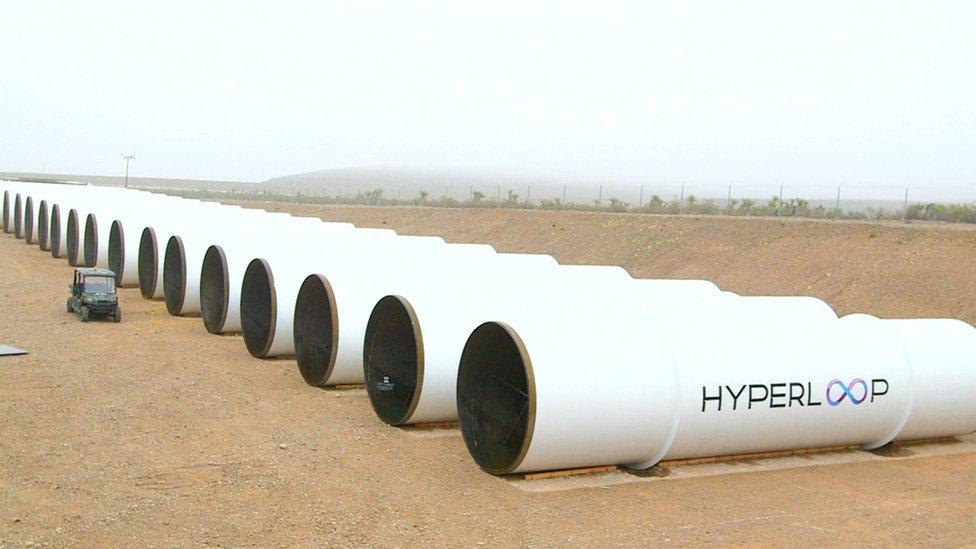
A prototype Hyperloop is being built in the Nevada desert
Shervin Pishevar is no stranger to ripping up the transport rulebook.
He was one of Uber's first backers and says even though the regulators tried to shut Uber down, "people basically forced it open again, because they wanted these types of solutions".
Of course apping-up taxis on existing infrastructure has immediate public appeal.
Tubing-up thousands of miles of land at massive cost might not invoke so much people power.
Still, $37m buys you a lot of pipe.
And the one I am now standing inside will be connected to 199 others by the end of this year to form the 3km (1.9 mile) Nevada test track.
"Welcome to the Hyperloop!" I shout for the camera.
And the acoustics cause my voice to reverberate along the tube.
It sounds futuristic, and, therefore, makes great TV.
Let's just hope Hyperloop can be more than just a pipedream.
- Published12 August 2013
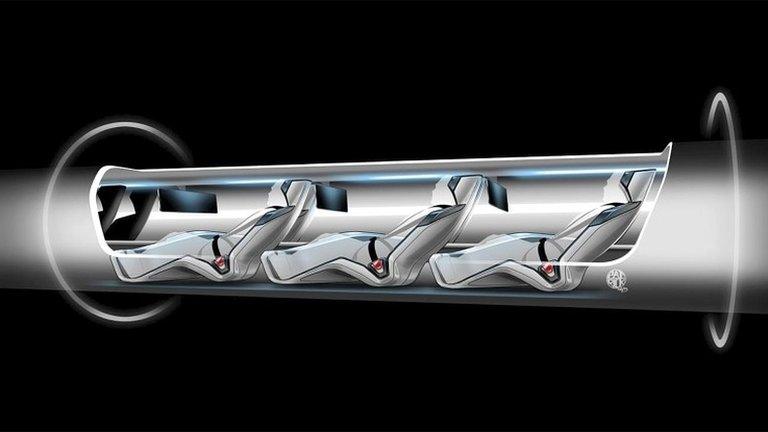
- Published12 August 2013
